A qualification from the Tshwane University of Technology (TUT) is more than just a stepping stone to a career – it is a passport to a world of possibilities and a testament to TUT’s goal of producing future-ready graduates. For an ambitious Animal Science student, Thoriso Digomo (22), that world now includes the rolling farmlands of Denmark, where he is completing his Work-Integrated Learning (WIL) and has already secured a permanent job offer. Speaking to Gerrit Bester, he shared his incredible journey, from the classrooms of TUT to the fields of Europe, proving that talent, hard work and a solid education can open doors that stretch far beyond South Africa’s borders.
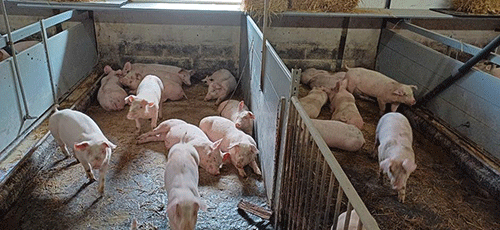
Healthy fed pigs.
Tell us a little about yourself. I was born in Pretoria and spent my formative years in both Pretoria and Limpopo. I started my primary education at the Gekombineerde Skool in Cullinan, where I matriculated in 2020.
Unfortunately, due to the late submission of my application to TUT, I was unable to secure admission and had to take a gap year.
In 2022, I began my tertiary education, pursuing a Diploma in Animal Science, Faculty of Science.
My upbringing was particularly enriching as I was privileged to experience and learn from both township and rural lifestyles.
What made you decide to study Animal Science and specifically at TUT? I was deeply inspired by my rural upbringing, where I was constantly surrounded by my grandfather's animals, including cattle, goats, sheep, chickens and dogs. Through the daily care and interaction with these animals, I developed a deep love and appreciation for them. As I grew older and realised my passion for animals, I wanted to pursue a career in Veterinary Science.
However, because I did not meet the academic requirements, I had to reconsider my career path while maintaining my focus on working with animals.
To explore different animal-related careers, I volunteered for three months at Zebra Country Lodge in Moloto, where I gained experience working with wildlife. While I appreciated the opportunity, I realised that my true calling was to work with domestic animals, as my upbringing had fostered a deep connection with them.
I also drew inspiration from my late sister, who also pursued a degree in Animal Science at TUT before tragically passing away in her first year in 2014. May her soul rest in peace. Her journey further motivated me to pursue this course, not only as a personal ambition, but also as a way to honour her legacy by completing the journey she started.
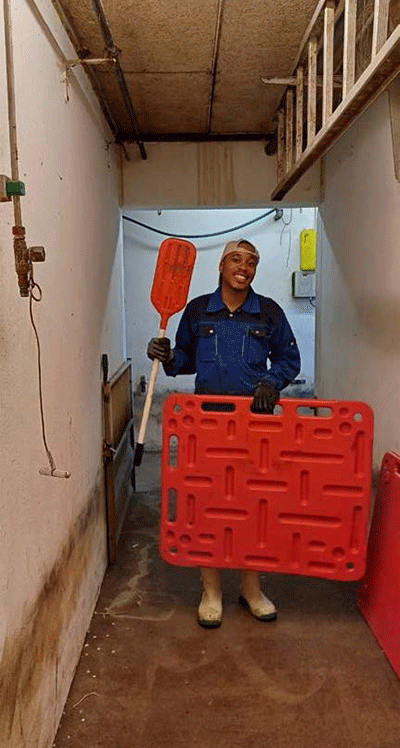
We are just about to receive small piglets. Luckily, I have
all the gear I need.
You are currently placed in Denmark for your WIL. How did this happen and how long have you been there? It has always been a dream of mine to either work or study abroad, as I believe it would provide me with valuable exposure to international farming standards. My goal is to acquire advanced knowledge and best practices that I can later apply to improve South African farming and ensure that it meets global standards.
Driven by this ambition, I sought information about international programmes from one of our esteemed lecturers, Dr Moses Ratsaka. I would like to express my gratitude to him for providing me with the contact details of a representative of an agency specialising in Danish farming programmes.
After contacting them, I received a positive response that eventually led to the incredible opportunity of an 18-month internship that allowed me to complete my WIL while fulfilling my dream of gaining international experience.
I have now been in Denmark for 13 months and my journey continues to be strong and fulfilling.
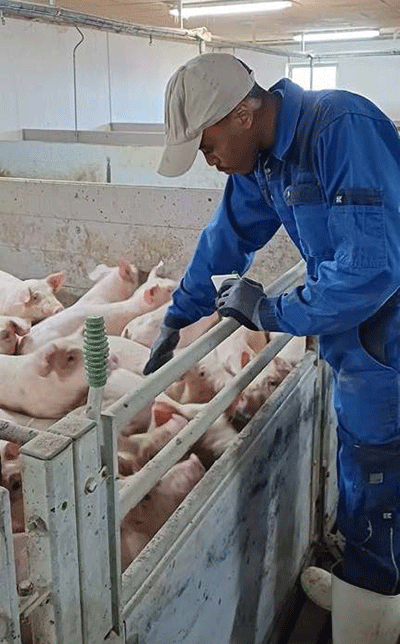
Having some playtime with the pigs.
Where exactly are you employed? I am currently based in the Danish countryside, on a farm called Svanholmgaard in a small town, Eskebjerg in Kalundborg.
I work as a feed operator for pigs, but my responsibilities go beyond managing their nutrition. I also play an important role in monitoring their health and general well-being.
As our farm operates as a breeding unit, maintenance is an important aspect of my work. Given the length of time the pigs spend in their pens before being sent to the slaughterhouse, it is essential that the farm infrastructure, including the pens, is kept in optimal condition.
As a result, I am actively involved in maintaining the overall structural integrity of the facility to promote efficiency and animal welfare.
What challenges did you face in adapting to Danish culture and how did you overcome them? Moving to a completely different continent naturally comes with cultural adjustments. For me, moving to Denmark presented several differences compared to South Africa, particularly in terms of weather and cultural norms.
However, the biggest challenge was the language barrier. Unlike South Africa, where multiple languages are widely spoken and English is commonly used, most written materials in Denmark are primarily in Danish.
Fortunately, I am able to communicate with my employer in English, which has made my transition much easier.
In addition, my foster home, where I am employed, has played a crucial role in my adjustment. They have warmly welcomed me, taken excellent care of me and generously shared their traditions and cultural practices with me. I truly believe that they have been instrumental in my integration into Danish society.
Can you speak some Danish? Unfortunately, not. However, I am planning to enrol in a language course soon, as I believe that learning the language will greatly ease my daily life and enhance my overall experience in Denmark.
What are the main differences between Denmark and your home country? There are many differences, including differences in culture, cuisine, infrastructure and economic systems.
From an agricultural perspective, Danish agricultural machinery is of superior quality and agricultural standards are strictly regulated.
Issues such as animal welfare and the emission of certain gases used in crop production are closely monitored and enforced. The overall investment in agriculture in Denmark is substantial and this commitment is reflected in the positive impact on the economy.
However, such progress is expected from a developed nation.
In contrast, South Africa, as a developing country, still has significant progress to make in the agricultural sector and the economy.
Nevertheless, I remain optimistic that with continued effort and investment, South Africa will eventually achieve similar levels of agricultural and economic excellence.
What do you miss the most about South Africa? Undoubtedly my family. They are the ones who raised me, shaped me and instilled in me the values I carry today.
While it is an incredible opportunity to be here, gaining knowledge and experience that will benefit my future, there is an incomparable joy in accomplishing something with your loved ones by your side.
I long for the moment when my parents can witness my growth first-hand and take pride in the person I have become, knowing that the lessons they have taught me have been well applied.
Being away from them for extended periods of time is challenging, but I understand that these sacrifices are necessary to build a better future.
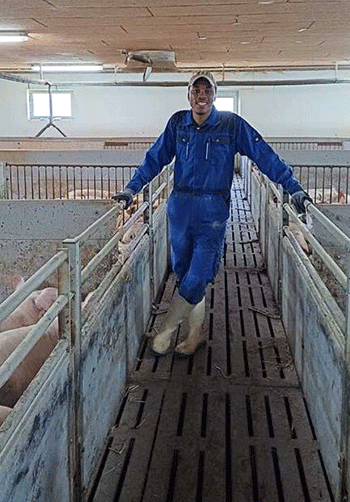
Just a happy intern.
You will graduate in May. You must be very excited. Will you be coming back for your graduation? Fortunately, through my hard work and dedication, my employer recognised my potential and offered me a permanent position upon completion of my WIL.
However, this has made it difficult for me to attend my graduation ceremony. The ceremony coincides with the peak of the Spring planting season, a crucial period that requires a great deal of effort to ensure optimal plant growth, which ultimately benefits the pigs.
The challenge stems from the fact that my employer and I are the only two workers on the farm, each with different responsibilities. While he primarily oversees crop production, I focus on animal care.
During peak harvest season, his workload increases significantly, making it difficult for him to assist me with tasks that require more than one pair of hands. As a result, my presence on the farm during this critical time is essential.
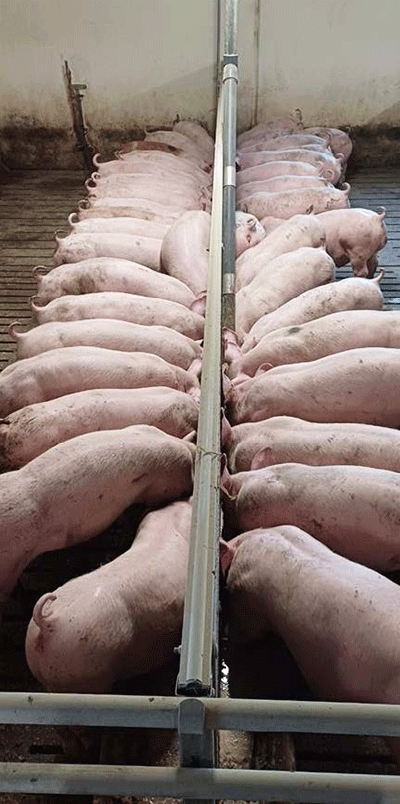
Feeding time.
The permanent position must be quite a feather in your cap . . . I deeply appreciate it and am truly honoured. I have worked extremely hard to get to this point, and when I first arrived, securing a permanent position was not even on my mind, as I was unaware of the opportunity.
Instead, I focused on improving myself every day, both to enhance my learning and to gain a strong reference for future applications. Receiving the offer was both surprising and incredibly rewarding.
I was unsure how to process it at first, but I am immensely grateful for the opportunity and everything I have learnt along the way.
What is a typical day in your life? My workday starts at 7:00, but I usually arrive 10 minutes early to make sure the fully automated feeding system is working properly before it starts feeding the pigs at 7:15.
During the fifteen minutes before feeding begins, I enter the shed, turn on all the lights and assess whether any adjustments need to be made to the feed distribution. Sometimes the pigs have too much or too little feed, especially the smaller ones, so I carefully balance their portions.
I then walk around the area during the feeding process, checking for any dead or injured pigs, noting them down if necessary and watching for signs of diarrhoea, especially in the younger pigs, as they are still adjusting to the change in diet. Fortunately, such cases are rarely serious.
Feeding finishes at 8:05, after which I turn my attention to the pigs' welfare. This includes administering medications as needed and providing straw on designated straw days, which are typically Tuesdays and Thursdays. This continues until 9:00, at which point I take a 30-minute coffee break with my employer.
During this time, he prepares the coffee and we use the break to discuss the day's plans and to engage in social conversation, sometimes about current politics, our families, or general topics of interest.
From 9:30 to 15:40, with a 30-minute lunch break at 12:00, my responsibilities revolve around farm maintenance. This includes tasks such as replacing wooden play structures in the pens and cleaning the feeding tanks to prevent mold contamination in the feed.
Since the workday ends at 16:00, I spend the last 20 minutes doing a final check on the pigs to make sure they are in good condition.
After work, I usually take a bath, prepare a meal and then relax by either listening to a podcast or calling friends and family back home.
How do you manage the work-life balance while working in a new country? Being in a new country, my social life is relatively limited and my primary focus is to be productive in all aspects.
However, I make a conscious effort to maintain strong connections with my family and friends back home through phone calls and social media.
So far, I have made a few friends in Denmark, mostly fellow South Africans who, like me, were brought here through the agency. We occasionally spend time together, which provides a sense of familiarity and comfort in this new environment.
What advice would you give to other Animal Science students considering a WIL placement abroad? First and foremost, although it is common advice, an unwavering commitment to your goal of learning and working abroad is essential. I would like to commend anyone who aspires to gain international experience, as it is not an easy journey.
However, it comes with significant benefits such as international credibility, a stable source of income, and most importantly, the opportunity to gain valuable knowledge that can be used to advance our nation's agricultural sector.
As the future farmers of our country, we have a responsibility to learn as much as we can and bring back our expertise to develop agriculture, one of the most important contributors to South Africa's economy. In doing so, we can inspire others to pursue agriculture and create employment opportunities, addressing a critical need in our country.
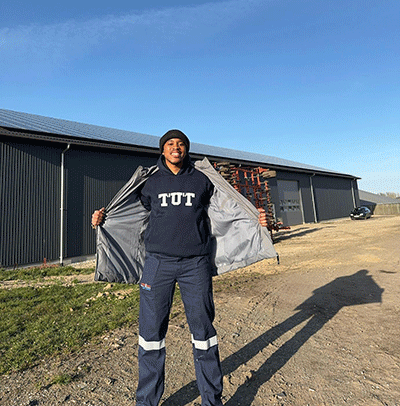
Thoriso Digomo flies the TUT flag high in Denmark.
The journey may be challenging, but with hard work and determination, success is within reach.
To young women interested in entering this field, I encourage you to pursue this journey despite the physical demands traditionally associated with agriculture. It may require extra effort, but it is certainly achievable.
I wish you all the best and urge you to seek international knowledge, embrace new opportunities and contribute to the growth of South Africa's agricultural sector.
It is up to us to rise, take action and build a better future for our country.
Looking back on your time in Denmark, what was the most important lesson you've learnt, both professionally and personally? Professionally, I have gained a deeper practical understanding of the impact of quality nutrition on animal productivity. I have also learnt that a farm of this size can be efficiently managed by just two people, as demonstrated by my employer and myself.
This has been made possible by advanced technology, such as the automated feeding system, which greatly streamlines operations.
Personally, I have come to realise the existence of the 'fear of the unknown'. Before embarking on this journey, I never thought I would be able to handle such a huge responsibility.
However, every day I am motivated by how far I have come, both literally and figuratively. This experience has been instrumental in my personal growth, shaping my mindset and strengthening my character in ways I never expected.
Anything else you would like to add. I would like to express my deepest gratitude to the Head of the Department of Animal Sciences, Prof Khathutshelo Nephawe, and the entire TUT for the unwavering support they have given me throughout this journey. I sincerely appreciate their encouragement and guidance.
I hope that my experiences and insights will inspire and help other students.
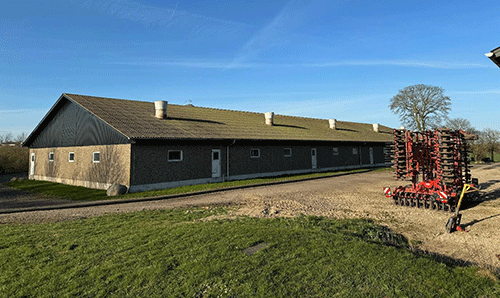
The pig shed and one of our machines, the cultivator.
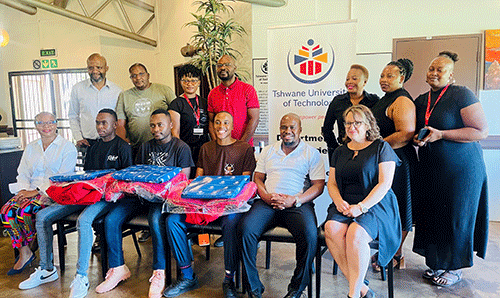
Thoriso during a farewell function hosted before his departure to Denmark.
